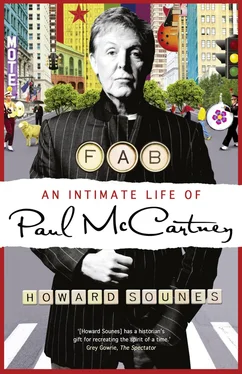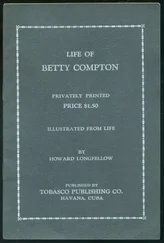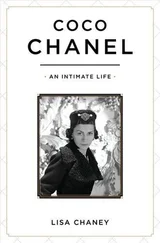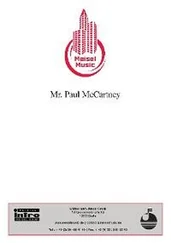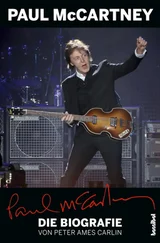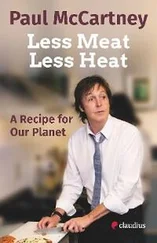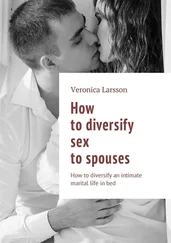Woolton Village is a short bike ride from John’s house, just east of Liverpool, its annual fête being organised by the vicar of St Peter’s Church, in the graveyard of which reside the remains of one Eleanor Rigby, who as her marker states died in 1939, aged 44. Starting at 2 o’clock on Saturday 6 July 1957, a procession of children, floats and bands made its way through Woolton to the church field, the procession led by the Band of the Cheshire Yeomanry and the outgoing Rose Queen, a local girl who sat in majesty on a flatbed truck. The Quarry Men followed on another, similar truck. Around 3 o’clock the new Rose Queen was crowned on stage in the church field, after which there was a parade of local children in fancy dress, and the Quarry Men played a few songs for the amusement of the kids as the adults mooched around the stalls. Looking at photographs taken that summer afternoon one is reminded that, although John’s band was named the Quarry Men, they were mere boys, gangly youths in plaid shirts, sleeves rolled up, their expressions betraying almost total inexperience as they haltingly sought to entertain an audience comprised mostly of even younger children. Typically, one little girl in a brownie uniform is captured on camera sitting on the edge of the stage looking up at John with the mildest of interest.
John, who had let his hair grow long at the front, then swept it back in a quiff, was standing at a stick microphone, strumming his guitar and singing the Dell-Vikings’ ‘Come Go With Me’. Unsure of the correct words, never having seen them in print, John was improvising lyrics to fit the tune, singing: ‘Come and go with me, down to the penitentiary …’ Paul McCartney thought this clever. Paul had been brought along to the fête by Ivan Vaughan, who knew John and thought his two musical friends should get together. The introduction was made in the church hall where the Quarry Men were due to play a second set. A plaque on the wall now commemorates the historic moment Lennon met McCartney. John recalled: ‘[Ivan] said, “I think you two will get along.” We talked after the show and I saw that he had talent. He was playing guitar backstage, doing “Twenty-Flight Rock”.’ In emulation of Little Richard, Paul also played ‘Long Tall Sally’ and ‘Tutti-Frutti’. Not long after this meeting Pete Shotton stopped Paul in the street and asked if he’d like to join the Quarry Men. He was asking on behalf of John, of course. ‘He was the leader because he was the guy who sang the songs,’ explains Colin Hanton, who was surprised how quickly John made up his mind about this new boy. ‘[Paul] must have impressed him.’
EARLY SHOWS
That summer Rod Davis went to France on holiday and never rejoined the Quarry Men. John Lennon left Quarry Bank High, having failed his O-levels, and was lucky to get a place at Liverpool College of Art, which happened to be next door to Paul’s grammar school on Hope Street. In their summer holidays, Paul and Mike McCartney attended scout camp, where Paul accidentally broke his brother’s arm mucking about with a pulley, after which Jim McCartney took his sons to Butlins in Filey, Yorkshire, where Paul and Mike performed ‘Bye Bye Love’ on stage as a duo.
Girls started to feature in Paul’s life around this time. A pale, unsporty lad with a tendency to podginess, Paul was no teenage Adonis, but he had a pleasant, open face (with straight dark brown hair and hazel eyes) and a confidence that helped make him personable. Meeting Sir Paul today it is his winning confidence that strikes one most strongly. Initially he just buddied around with girls in a group, girls like Marjorie Wilson, whom he’d known since primary school. Likewise he knocked about with Forthlin Road neighbour Ann Ventre, despite getting into a fight with her brother Louis after Paul made a derogatory remark about the Pope (indicating that he didn’t see himself as a Catholic). Paul said one interesting thing to Ann. ‘I’ll be famous one day,’ he told her boldly.
‘Oh yes. Ha! Will you now?’ she replied, astounded by that confidence. Like many people who become very successful, Paul knew at a young age that he would do well. No doubt the fact he had come from such a happy and supportive home helped, being the apple of Mother’s and Father’s eyes. We must also credit him with natural musical talent, some genius even, of which he was himself already aware. If not misplaced, confidence is very attractive and by the time he was 15 Paul had his pick of girlfriends. He lost his virginity to a local girl he was babysitting with, the start of what became a full sexual life.
Being in a band was an excellent way to meet girls; it is one of the primary reasons teenage boys join bands. But early Quarry Men gigs brought the lads more commonly into the company of the men who operated and patronised the city’s social clubs: the Norris Green Conservative Club and the Stanley Abattoir Social for example. Small-time though these engagements were, Paul took every gig seriously. It was he who first acquired a beige stage jacket, John following suit, and it was Paul who got the Quarry Men wearing string ties. ‘I think Paul had more desire to be successful than John,’ comments drummer Colin Hanton. ‘Once Paul joined there was a movement to smarten us up.’ Paul was also quick to advise his band mates on their musicianship. Having taught himself the rudiments of drumming, he gave Colin pointers. ‘He could be a little bit pushy,’ remarks Colin, a sentiment many musicians have echoed.
Of an evening and at weekends Paul would cycle over to John’s house to work on material. It was a pleasant bike ride across Allerton Golf Course, up through the trees and past the greens, emerging onto Menlove Avenue, after which Paul had to cross the busy road and turn left to reach Mendips. ‘John, your little friend’s here,’ Aunt Mimi would announce dubiously, when Master McCartney appeared at her back door. The boys practised upstairs in John’s bedroom, decorated with a pin-up of Brigitte Bardot, whom they both lusted after. Sometimes they played downstairs in the lounge, a large, bright room with a cabinet of Royal Albert china. Uneasy about the boys being in with her best things, Mimi preferred them to practise in the front porch, which suited John and Paul, because the space was acoustically lively. Here, bathed in the sunlight that streamed in through the coloured glass, Lennon and McCartney taught each other to play the songs they heard on the radio, left-handed Paul forming a mirror image of his right-handed, older friend as they sat opposite each other, trying to prevent the necks of their instruments clashing, and singing in harmony. Both had good voices, John’s possessing more character and authority, which Paul made up for by being an excellent mimic, particularly adept at taking off Little Richard. Apart from covering the songs of their heroes, the boys were writing songs, the words and chord changes of which Paul recorded neatly in an exercise book. He was always organised that way.
During term time, Paul and John met daily in town, which was easy now with John studying next door at the art college. Here, Lennon fell in with a group of art students who styled themselves self-consciously the Dissenters, meeting over pints of beer in the pub round the corner, Ye Cracke. Like students the world over, the Dissenters talked earnestly of life, sex and art. Beatnik culture loomed large, the novels of Jack Kerouac and the poetry of Allen Ginsberg and Lawrence Ferlinghetti being very fashionable. The work of these American writers was of great interest to the Dissenters up to the point, significantly, where they decided they didn’t have to be in thrall to American culture. ‘We sat there in the Cracke and thought Liverpool is an exciting place,’ remembers Bill Harry, a founder member of this student group. ‘We can create things and write music about Liverpool, just as the Americans [do about their cities].’ Although the Quarry Men, and later the Beatles, would play rock ’n’ roll in emulation of their American heroes, importantly John and Paul would create authentic English pop songs, with lyrics that referred to English life, sung in unaffected English accents. The same is also true of George Harrison.
Читать дальше
